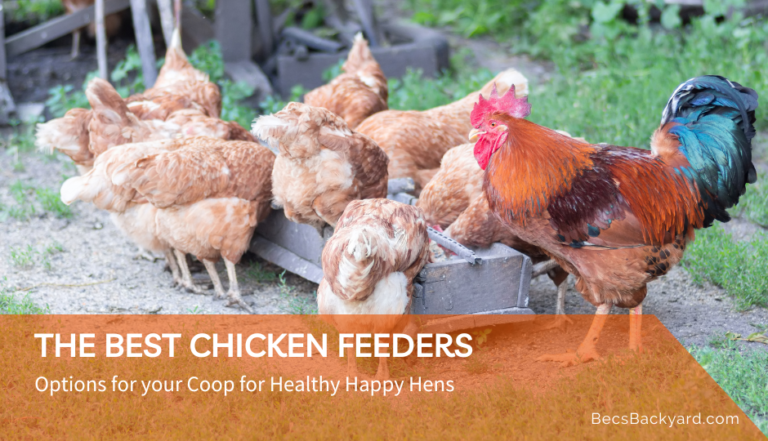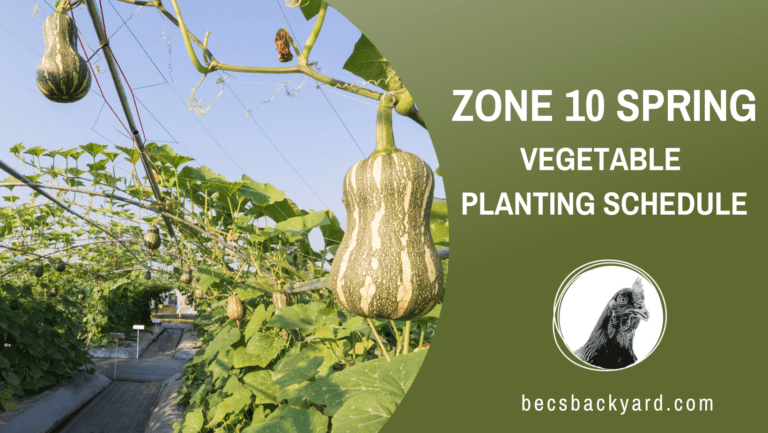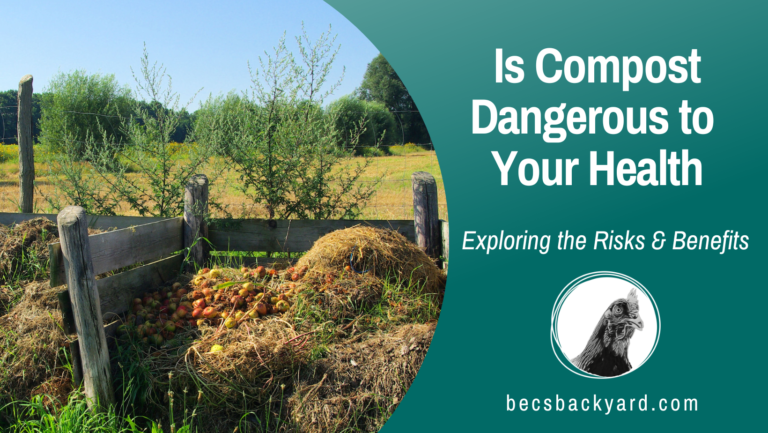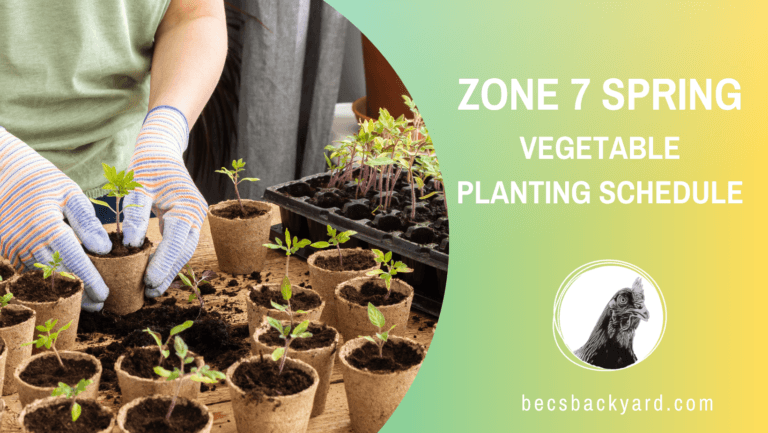Top 5 Crops to Grow for Chickens: Boost Your Flock’s Nutrition

Chickens are omnivores and require a varied diet to stay healthy and produce high-quality eggs. While commercial chicken feed can provide all the necessary nutrients, growing crops for chickens is a rewarding way to supplement their diet with fresh, nutritious food. In this article, we will explore the top 5 crops to grow for chickens, their benefits, and how to grow them.
Understanding a chicken’s diet is crucial in selecting the right crops to grow for them. Chickens require a balanced diet of protein, carbohydrates, vitamins, and minerals to stay healthy and productive. Growing crops for chickens not only provides them with fresh, nutritious food but also helps reduce feed costs. Additionally, chickens love to forage and will enjoy scratching and pecking at the crops, which can keep them entertained and reduce stress.

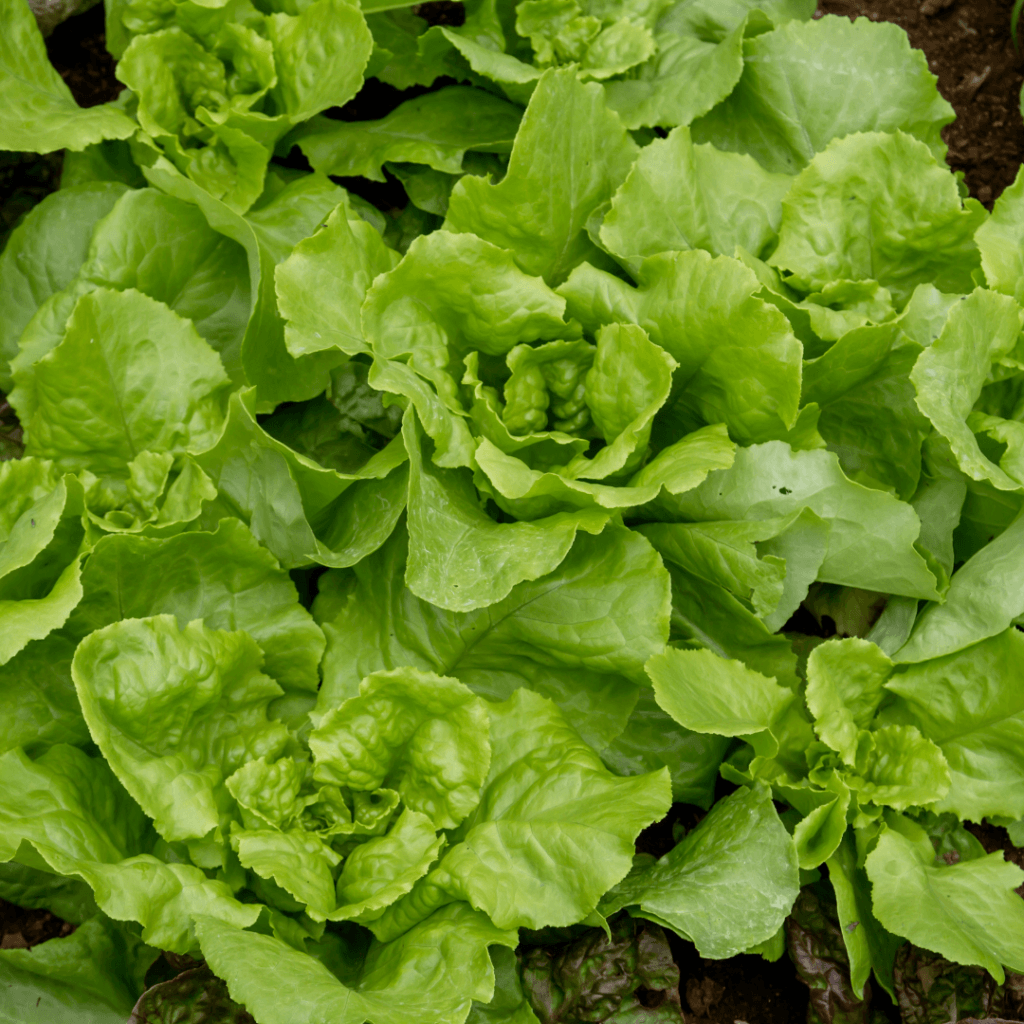


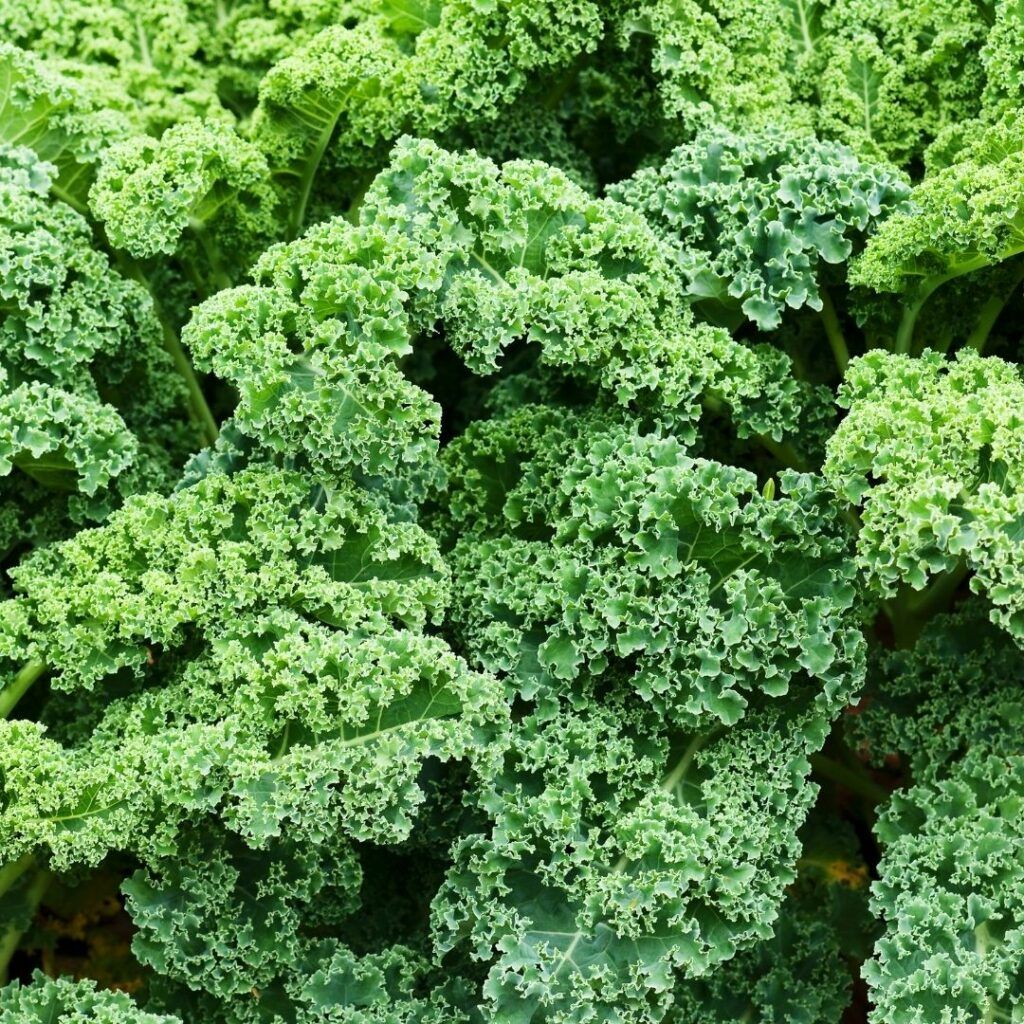

Growing crops for chickens can be a fun and rewarding experience, but it’s important to choose the right crops that are safe and beneficial for them. In the following sections, we will discuss the top 5 crops to grow for chickens, their benefits, and how to grow them successfully.
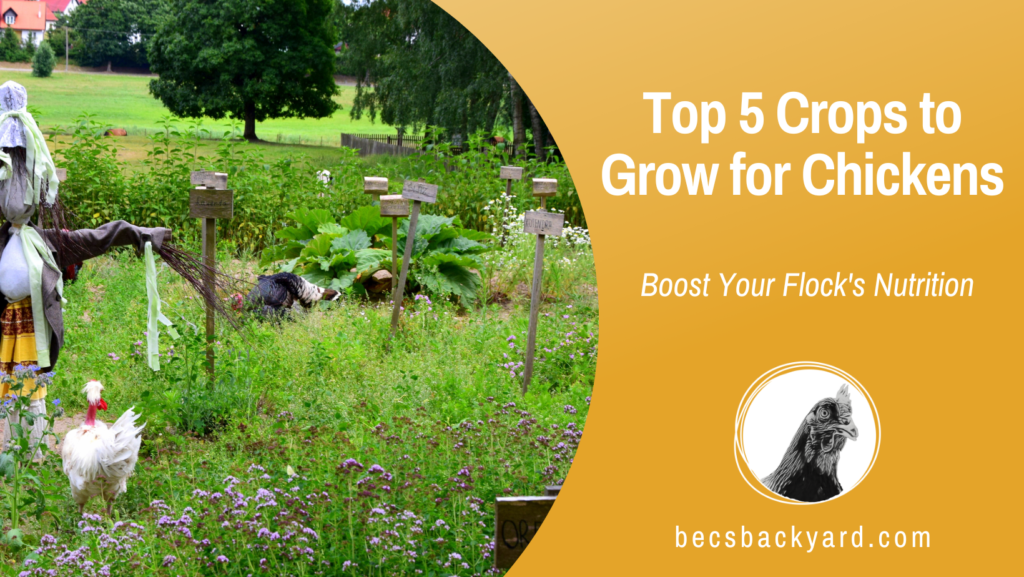
Understanding Chicken Diet
Chickens are omnivores, which means they eat both plants and animals. They require a balanced diet that includes protein, carbohydrates, fats, vitamins, and minerals to maintain good health and produce high-quality eggs. Understanding the nutritional needs of chickens is essential for growing crops that provide them with the right balance of nutrients.
Protein
Protein is essential for muscle development, feather growth, and egg production. Chickens require a high-protein diet, especially when they are young and growing. Adult chickens need at least 16% protein in their diet to maintain good health and produce eggs. Good sources of protein for chickens include insects, worms, and other small animals, as well as legumes, grains, and seeds.
Carbohydrates
Carbohydrates provide energy for chickens. They are an essential part of their diet, but too much can lead to obesity and health problems. Chickens can get carbohydrates from grains like corn, wheat, and barley, as well as from fruits and vegetables.
Fats
Fats are an essential part of a chicken’s diet. They provide energy and help with the absorption of vitamins. Chickens can get fats from sources like sunflower seeds, peanuts, and soybeans.
Vitamins and Minerals
Vitamins and minerals are essential for a chicken’s overall health and well-being. They play a role in bone development, immune function, and egg production. Chickens can get vitamins and minerals from a variety of sources, including fruits, vegetables, and supplements.
Water
Water is essential for chickens. They need access to clean, fresh water at all times. Chickens can drink up to a liter of water per day, depending on the temperature and humidity.
Understanding the nutritional needs of chickens is essential for growing crops that provide them with the right balance of nutrients. Chickens require a balanced diet that includes protein, carbohydrates, fats, vitamins, and minerals to maintain good health and produce high-quality eggs.
Top 5 Crops to Grow for Chickens
When it comes to growing crops for chickens, there are many options to choose from. However, some crops are more beneficial for chickens than others. In this section, we will discuss the top five crops to grow for chickens.
Lettuce
Rich in vitamins and minerals: Lettuce is a good source of vitamins A, C, and K, as well as minerals such as iron and calcium. Lettuce is high in fiber, which can help improve digestion in chickens and prevent digestive issues. Growing lettuce can be a cost-effective way to provide chickens with a nutritious and healthy food source
Sunflower Seeds
Sunflower seeds are a great source of protein for chickens. They are also a good source of essential fatty acids, which are important for healthy feathers and egg production. Sunflowers are easy to grow, and chickens love to eat the seeds. However, it is important to note that sunflowers should be fed in moderation, as they are high in fat.
Peas
Peas are a great source of protein for chickens. They are also rich in minerals and vitamins such as vitamins A & K, iron and calcium. Another benefit is that they aid digestion because they are high in fiber. Peas are easy to grow and can be harvested multiple times throughout the growing season. Pea plants also attract beneficial insects, which can help keep your garden healthy.
Kale
Kale is a superfood for both humans and chickens. It is packed with vitamins and minerals, and chickens love to eat it. Kale is easy to grow and can be harvested multiple times throughout the growing season.
Clover
Clover attracts insects such as bees and butterflies, which can help pollinate other plants in the area. Clover is a legume that is high in protein, which is essential for the growth and development of chickens. Clover is also rich in vitamins and minerals such as vitamin A, vitamin C, iron, and calcium, which are important for the overall health of chickens.
When it comes to growing crops for chickens, it is important to choose crops that are high in nutrients and easy to grow. Our top five crops to grow for chickens are lettuce, sunflower seeds, peas, kale and clover. By including these crops in a chicken’s diet, you can ensure that they are getting the nutrients they need to be healthy and productive.
Benefits of Growing Crops for Chickens
Growing crops for chickens can be a beneficial practice for both the chickens and their owners. Here are some reasons why:
Cost-effective: Growing crops for chickens can be a cost-effective way to provide them with a nutritious diet. It can significantly reduce the amount spent on commercial chicken feed.
Nutritious diet: Chickens that have access to a variety of crops have a more balanced and nutritious diet. Crops such as kale, turnips, and buckwheat are rich in vitamins and minerals that are essential for the chickens’ health.
Improved egg quality: Chickens that have access to a diverse range of crops tend to lay eggs with a richer yolk color and stronger shells. This is because the chickens are getting a more varied diet that includes a range of nutrients.
Reduced waste: Growing crops for chickens can help reduce food waste. Leftover scraps from the garden can be fed to the chickens, reducing the amount of food waste that ends up in the landfill.
Environmental benefits: Growing crops for chickens can have environmental benefits. Chickens that have access to a diverse range of crops are less likely to damage the soil in their foraging areas. Additionally, growing crops can help improve soil health and reduce erosion.
Overall, growing crops for chickens can be a rewarding and beneficial practice for both the chickens and their owners. By providing the chickens with a more varied and nutritious diet, owners can improve the health and productivity of their flock while reducing their feed costs.
How to Grow These Crops
Planting
When planting crops for chickens, it’s important to choose varieties that are easy to grow and provide maximum nutrition for your birds. Here are some tips for planting the top five crops for chickens:
Lettuce:
- Choose a location with well-draining soil and full sun exposure.
- Sow seeds directly into the soil, about 1/4 inch deep and 6 inches apart.
- Water regularly to keep the soil moist.
- Harvest lettuce when the leaves are full-sized but before they become bitter.
Sunflowers:
- Choose a location with well-draining soil and full sun exposure.
- Sow seeds directly into the soil, about 1 inch deep and 6 inches apart.
- Water regularly to keep the soil moist.
- Provide support for the sunflowers as they grow taller.
- Harvest sunflower seeds when the flower heads have dried and the seeds are brown.
Peas:
- Choose a location with well-draining soil and full sun exposure.
- Sow seeds directly into the soil, about 1 inch deep and 2 inches apart.
- Water regularly to keep the soil moist.
- Provide support for the peas as they grow taller.
- Harvest peas when the pods are full-sized but before they become tough.
Kale:
- Choose a location with well-draining soil and full sun exposure.
- Sow seeds directly into the soil, about 1/2 inch deep and 12 inches apart.
- Water regularly to keep the soil moist.
- Harvest kale when the leaves are full-sized but before they become tough.
Clover:
- Choose a location with well-draining soil and full sun exposure.
- Sow seeds directly into the soil, about 1/4 inch deep and 6 inches apart.
- Water regularly to keep the soil moist.
- Clover can be harvested continuously by cutting it back to about 2 inches above the ground.
Maintenance
Maintaining your chicken garden is key to keeping your crops healthy and productive. Here are some tips for maintaining the top five crops for chickens:
Lettuce:
- Water regularly to keep the soil moist, but avoid overwatering.
- Mulch around the base of the plants to help retain moisture and suppress weeds.
- Fertilize with a balanced fertilizer every 3-4 weeks.
- Keep an eye out for pests such as aphids and slugs, and treat as necessary.
- Harvest lettuce regularly to encourage new growth.
Sunflowers:
- Water regularly to keep the soil moist, but avoid overwatering.
- Mulch around the base of the plants to help retain moisture and suppress weeds.
- Fertilize with a balanced fertilizer every 3-4 weeks.
- Provide support for the sunflowers as they grow taller.
- Deadhead spent flowers to encourage new blooms.
Peas:
- Water regularly to keep the soil moist, but avoid overwatering.
- Mulch around the base of the plants to help retain moisture and suppress weeds.
- Fertilize with a balanced fertilizer every 3-4 weeks.
- Provide support for the peas as they grow taller.
- Keep an eye out for pests such as aphids and pea weevils, and treat as necessary.
Kale:
- Water regularly to keep the soil moist, but avoid overwatering.
- Mulch around the base of the plants to help retain moisture and suppress weeds.
- Fertilize with a balanced fertilizer every 3-4 weeks.
- Keep an eye out for pests such as aphids and cabbage loopers, and treat as necessary.
- Harvest kale regularly to encourage new growth.
Clover:
- Water regularly to keep the soil moist, but avoid overwatering.
- Fertilize with a balanced fertilizer every 3-4 weeks.
- Mow or cut back the clover regularly to encourage new growth and prevent it from becoming too woody.
- Keep an eye out for pests such as aphids and clover mites, and treat as necessary.
Potential Challenges and Solutions
Pests
One of the main challenges of growing crops for chickens is dealing with pests. Chickens can attract a variety of pests, including rodents, insects, and wild birds. These pests can damage crops, spread diseases, and even harm chickens themselves.
To prevent pests from damaging crops, farmers can use natural pest control methods such as companion planting, crop rotation, and physical barriers. Chickens themselves can also be used as natural pest control by allowing them to free-range in the garden.
Weather Conditions
Weather conditions can also pose a challenge to growing crops for chickens. Extreme temperatures, drought, and heavy rain can all affect crop growth and yield. In addition, chickens may damage crops by scratching and pecking at them.
To mitigate the effects of weather conditions, farmers can use various techniques such as mulching, irrigation, and shade cloth. They can also choose crops that are more resilient to extreme temperatures and drought.
In summary, growing crops for chickens can be challenging due to pests, weather conditions, and other environmental factors. However, by using good agricultural practices and natural pest control methods, farmers can overcome these challenges and provide healthy and nutritious crops for their chickens.
Frequently Asked Questions
What are some good crops to grow for chicken feed?
Chickens love to eat a variety of crops, including grains, vegetables, and herbs. Some good crops to grow for chicken feed include corn, wheat, barley, oats, peas, beans, sunflowers, pumpkins, and squash. These crops are high in protein, fiber, and other essential nutrients that chickens need to stay healthy and happy.
What are some fast-growing plants that chickens can eat?
Fast-growing plants that chickens can eat include clover, alfalfa, amaranth, and buckwheat. These plants are easy to grow and provide a quick source of food for chickens. They are also high in protein and other essential nutrients that chickens need to thrive.
What are some shade plants that are safe for chickens?
Shade plants that are safe for chickens include comfrey, mint, lemon balm, and parsley. These plants can be grown in areas where chickens like to hang out and provide a cool and shady spot for them to rest. They are also safe for chickens to eat and can provide some additional nutrients to their diet.
What are some cover crops that are good for chickens?
Cover crops that are good for chickens include clover, alfalfa, and rye. These crops can be grown in areas where chickens like to forage and provide a source of food and cover for them. They also help to improve soil health and fertility, making them a great choice for any garden.
What are some winter plants that chickens can eat?
Winter plants that chickens can eat include kale, collards, and turnips. These plants are hardy and can withstand cold temperatures, making them a great choice for winter gardening. They are also high in nutrients and can provide some additional variety to a chicken’s diet.
What are some climbing plants that are safe for chickens to eat?
Climbing plants that are safe for chickens to eat include cucumbers, peas, and beans. These plants can be grown on trellises or other structures and provide a source of food and shade for chickens. They are also safe for chickens to eat and can provide some additional nutrients to their diet.
Conclusion
In conclusion, growing crops for chickens is a great way to provide them with a healthy and nutritious diet while also saving money on feed costs. By growing crops such as alfalfa, squash, fennel, and sunflowers, chicken owners can ensure that their birds have access to a variety of vitamins, minerals, and protein sources.
It is important to keep in mind that not all crops are safe for chickens to eat, so it is essential to do research and consult with experts before planting anything in the chicken yard. Additionally, it is important to ensure that the crops are grown organically and free from pesticides and other harmful chemicals.
By incorporating a variety of crops into their diet, chickens can stay healthy and happy, which can lead to better egg production and overall well-being. With a little bit of planning and effort, chicken owners can provide their birds with a healthy and diverse diet that will keep them thriving for years to come.


